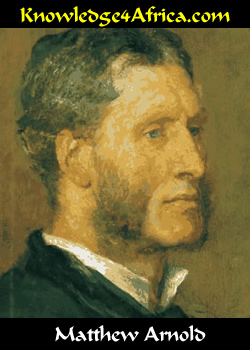|
READ THIS
In this sonnet the poet observes a beggar in the rich area of Belgrave Square. She uses her daughter to
beg from the working class, while avoiding the wealthy.
 A NOTE ON THE POET
A NOTE ON THE POET
Matthew Arnold was born in December 1822, the son of the headmaster of the now famous Rugby
School.
He was initially tutored at Rugby but, in 1841, began studying at Oxford University where he graduated
in 1844.
He started teaching at Rugby but, in 1847, became Private Secretary to Lord Lansdowne who was Lord
President of the Council. It was then that he published his first book of poetry.
Arnold soon took up a position as an inspector of schools and, because of the increased salary, almost
immediately married Frances Wightman with whom he had six children.
He was elected Professor of Poetry at Oxford in 1857 and was apparently the first man to deliver his
lectures in English instead of Latin.
In 1883 and 1884, he toured the United States where he delivered lectures on education and democracy.
He retired from school inspection in 1886 but, just two years later, he suffered a heart attack and died.
He was then 66 years of age.
Arnold is heralded today -- along with Tennyson and Browning -- as one of the great Victorian poets
although his poetry received only mediocre reviews during his own lifetime.
Have you looked at the questions
in the right column?
|
TEST YOURSELF!
Read the left column and then answer
the following questions:
"Crouch'd on the pavement close by Belgrave Square."
- Explain why the poet specifies the area. (3)

[Need help?]
Belgrave Square is a very wealthy area in London. The poet uses the grandness of the area to contrast
with the destitute beggar and her daughter.
By means of this contrast he draws attention to their poverty-stricken state. It also serves to emphasise
the vast difference between the poor and the rich.
|
"Crouch'd on the pavement."
- What is the connotation of the word "Crouch'd"? (3)

[Need help?]
The word helps to convey the woman's destitute state. She is bent over. She is ill, so it is as though she
is too weak to stand up straight.
|
"ill, moody and tongue-tied."
- Why has the poet referred to the tramp as "moody and tongue-tied"? (4)

[Need help?]
The beggar is moody because she is ill and feeling tired and fed-up. Her situation makes her angry and
depressed.
She is tongue-tied because she is not talking, probably because she doesn't have the strength. She uses
touch, not words, to send her daughter over to beg.
|
"their clothes were rags."
- Identify the figure of speech in this line and explain its effectiveness. (3)

[Need help?]
The poet has used a metaphor to compare their clothes to rags. This is done to emphasise their destitute
and poverty-stricken state.
Rags are usually torn pieces of unwanted cloth that we use to wipe up spills. This family is so poor that
their clothes are as old and worn as rags.
Their poverty is further highlighted by the fact that "their feet were bare".
|
"Some labouring men, whose work lay somewhere there."
- Explain the incongruity in the above line. (3)

[Need help?]
These men are labourers and as working class men they stick out like sore thumbs in this upper class
area.
The poet makes it clear that they do not belong in the area. They are only there because they have a task
to perform for one of the wealthy inhabitants of the area.
|
"The rich she had let pass with frozen stare."
- What does this line convey about her attitude towards the rich? (3)

[Need help?]
Her "frozen stare" conveys her disgust and disdain for the rich. She has too much pride to beg
from them and merely gives them a cold, hard glare.
|
- Why does she not send her daughter to beg from the rich? (2)

[Need help?]
Her attitude is that the poor will look after the poor. The rich are too superior to stoop to help the less
fortunate.
The labourers understand her plight and are more inclined to be sympathetic. She knows that the rich
look down on her and she is too proud to beg from them.
|
"Above her state this spirit towers."
- Explain the effectiveness of the metaphor in this line. (4)

[Need help?]
Her spirit or her pride is compared with a tower, something which stands out and is noticeable. Her pride
and dignity are therefore obvious, in spite of her lowly status.
She has not allowed her poverty and destitute situation to rob her of her dignity. She remains proud in
spite of her terrible circumstances.
|
"The girl, who hied across."
- Explain the meaning of "hied". (1)

[Need help?]
It is an archaic word (an old word which has fallen out of use) which means "hurried".
|
Identify and discuss the type of sonnet. (4)

[Need help?]
This is an Italian sonnet. The first eight lines (the octave) sets the scene and describes what the poet
observes: a tramp with her two children, begging in the square.
A change occurs in the sestet. This change is introduced by the words "Thought I". These words
show how the scene he has observed affects the poet.
In the sestet (the last six lines) the poet reflects on the beggar's state and the lesson she teaches us: if
we all help each other, then society and the world can be a better place.
|
|



